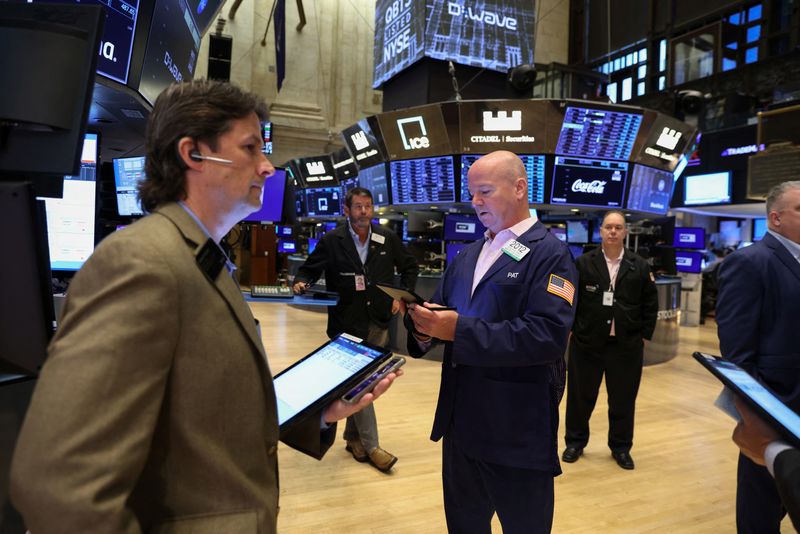By David Randall and Saqib Iqbal Ahmed
NEW YORK (Reuters) - Upbeat economic data in Germany and gains in U.S. mega-cap growth stocks helped lift an index of global stock markets on Thursday, while U.S. Treasury yields slipped as investors waited for the Federal Reserve's Jackson Hole meeting for insights into the central bank's plans to combat inflation.
The Federal Reserve's annual monetary policy conference begins on Friday in Wyoming, with the focus on what Fed Chair Jerome Powell might say when he speaks at the conference at 10 a.m. EDT (1400 GMT) on Friday. Investors will be looking for clues on how much higher U.S. interest rates might need to go and for how long, if inflation does not significantly fall from its current 40-year highs.
"We're in a period of time between the end of the second-quarter earnings season and meaningful additional data from the Federal Reserve. Markets are churning a bit with a reasonably low level of volatility," said Bill Northey, senior investment director at U.S. Bank Wealth Management in Minneapolis.
GDP data from Germany, Europe's largest economy, showed the country narrowly avoided a contraction in the second quarter and better-than-feared confidence data helped keep investors' appetite firm, briefly lifting the battered euro back above dollar parity.
The euro fell back under $1 by the time details from last month's European Central Bank meeting - when the bank hiked rates by 50 basis points (bps) - showed concerns among policymakers that inflation is becoming entrenched.
MSCI's gauge of stocks across the globe rose 1.26%, helped by gains on Wall Street.
The Dow Jones Industrial Average rose 322.55 points, or 0.98%, to finish at 33,291.78, the S&P 500 gained 58.35 points, or 1.41%, to close at 4,199.12 and the Nasdaq Composite added 207.74 points, or 1.67%, to end the session at 12,639.27.
The pan-European STOXX 600 index closed the session up 0.30%.
U.S. Treasury yields slid on Thursday after hitting multi-week highs the previous session, as investors balanced positions amid uncertainty ahead of Powell's speech.
"The bond market has already done a lot of the heavy lifting for continued messaging of a 75 basis-point hike in September," said Rich Steinberg, chief market strategist at the Colony Group in Boca Raton, Florida.
"I think the political risk for the Fed of not doing 75 is just too great, because if they slow it down in September and then the data show inflation is still too persistent, it will be hard to message to the markets to go back to be more restrictive," he added.
The yield on benchmark 10-year Treasury notes was down 6.7 bps at 3.037%.
JACKSON HOLE
Investors have pared back expectations the Fed could tilt to a slower pace of rate hikes as U.S. inflation remains at 8.5% on an annual basis, well above the Fed's 2% target. But Powell's speech due on Friday will be scrutinized for any indication that an economic slowdown might alter the Fed’s strategy.
Investors now expect the Fed Funds rate to peak at 3.80% in March 2023, up from 3.62% a fortnight ago, said Tapas Strickland, NAB's economics director.
Interest rate futures imply a 60% chance of a 75 bp Fed hike in September, up from 50% earlier this week. Euro zone money markets are now pricing in around 100 bps of ECB rate hikes by October, including a slight chance of 75 bps move next month.
In currency markets, the dollar slipped 0.2% against a basket of currencies, while the euro was 0.05% higher at $0.9974, just below parity with the U.S. currency.
Oil prices fell on Thursday in volatile trade as investors braced for the possible return to global markets of sanctioned Iranian oil exports and on worries that rising U.S. interest rates would weaken fuel demand.
Brent crude settled at $99.34 a barrel, shedding $1.88, or 1.9%. U.S. West Texas Intermediate crude settled at $92.52 a barrel, losing $2.37, or 2.5%.

Deutsche Bank (ETR:DBKGn) strategist Jim Reid said the worry was that the energy situation in Europe keeps getting worse.
"That’s adding to fears that 'peak inflation' might not actually have arrived yet for some countries," he said. "Policymakers are about to face some unenviable choices as they grapple with the worst stagflation we’ve seen in decades."
